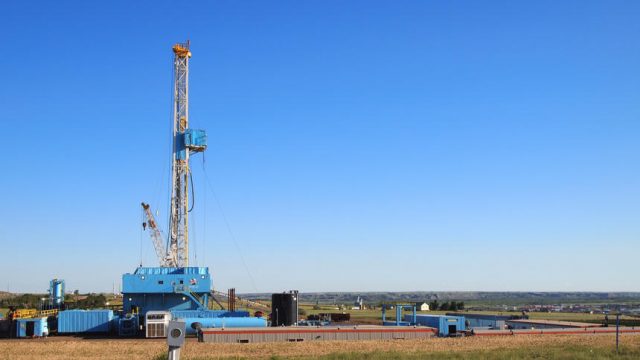Far From a Bust, They’re Still Hiring in the North Dakota Oil Patch

A drilling rig, pictured Wednesday, June 22, 2016, in Williston, N.D., moved into Williams County, bringing the statewide rig count to 30. Williams County, which once had as many as 48 rigs, was down to zero until this rig moved in last week. Amy Dalrymple/Forum News Service
The end of North Dakota’s oil boom – which I was among the first to write about, I think, way back in 2014 – prompted no small amount of schandenfreude in some circles.
Certain media types, always on the hunt for a negative story to tell, were quick to announce that the oil boom had gone bust. Those of certain political proclivities were delighted as well.
But while the oil boom in North Dakota is most certainly over, causing somewhat painful transitions to a post-boom “new normal” for our state, a bust remains not in evidence.
Case in point, this report from the Williston Herald which finds that their community – which is arguably the epicenter of the Bakken oil play – is not only still hiring, they’ve got a labor shortage:
Williston has jobs — what it needs right now are people to fill them.
The latest figures show more than 1,000 jobs listings, according to Cindy Sanford, office manager for Job Services ND in Williston. She is not entirely certain where all those people are going to come from.
“We are full up,” Sanford said. “We have all kinds of employers lined up. We need people in big words. Like exclamation mark people.”
“Fully half of the 55 employers signed up for the Williston job fair are offering oilfield-related work,” the Herald reports, quoting Sanford as saying it’s “a lot, for oil being nothing.”
No doubt.
Earlier this year UND economist David Flynn wrote in a column for SAB that North Dakota’s economic outlook was not as bleak as some were making it out to be, and that the real problem the state was facing wasn’t economic growth so much as a chronic sort of labor shortage.
“North Dakota needs to deal with recurring labor constraints,” he wrote in February.
The limits on North Dakota growth are more likely to come from labor supply issues, which actually means there should be investigations of business models that rely less on labor and more on technology or capital.”
That’s a big challenge for a state that has an unfortunate reputation for being cold, desolate, and far too insular for it’s own good.
But it also puts lie to the notion that the state economy is in post-boom free fall. The facts simply don’t support it.




